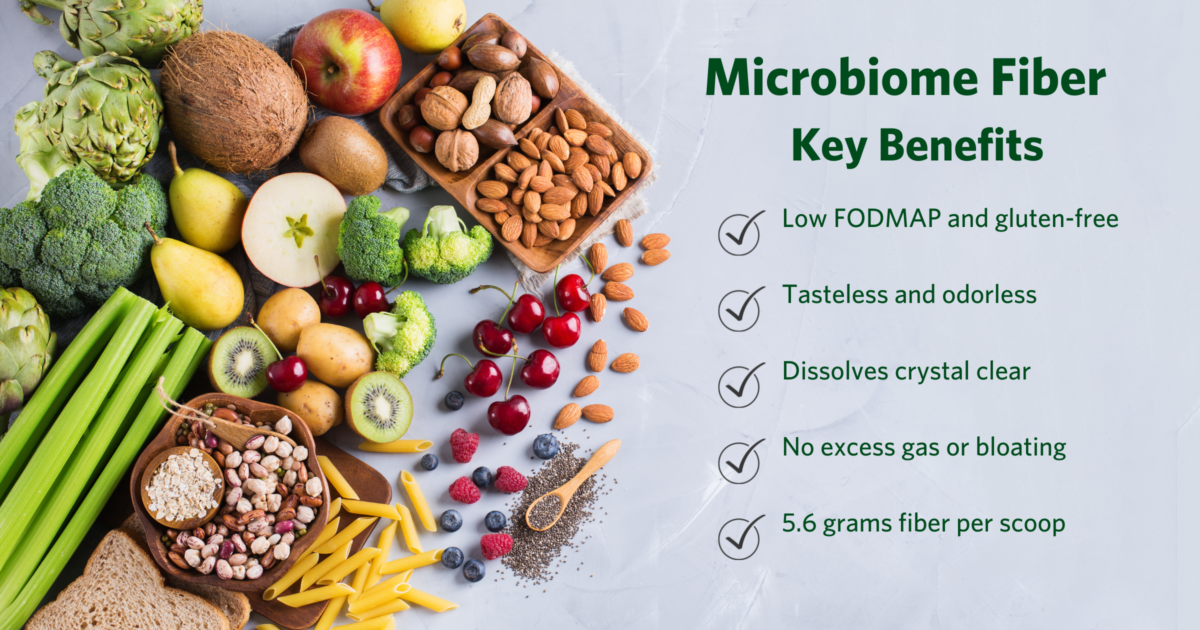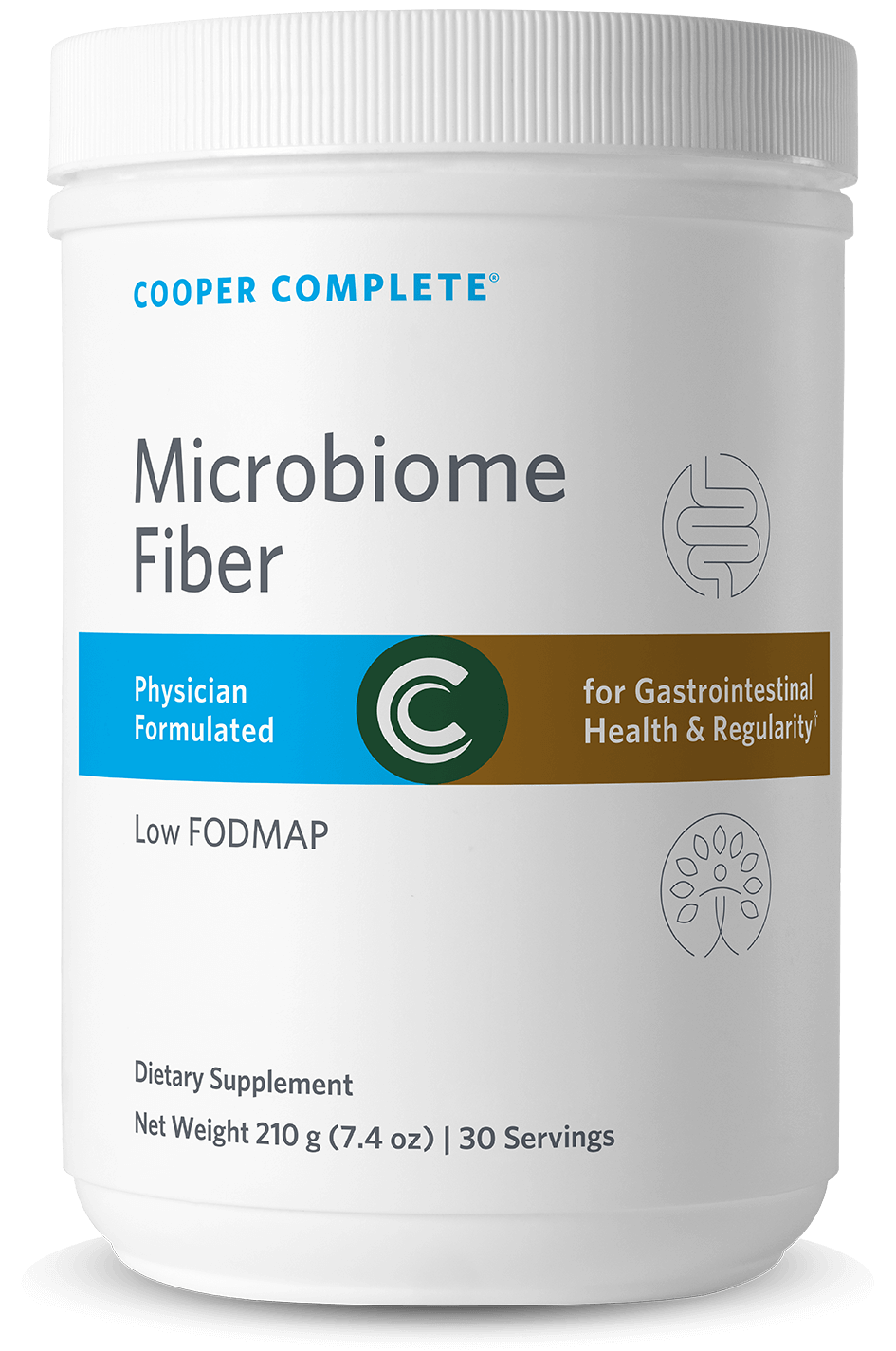Health Benefits of Fiber Supplements

The benefits of fiber are known to most of us, and two-thirds of us believe we meet our fiber needs. However, the American Society for Nutrition states that only 5% of men and 9% of women are getting the recommended daily amount of fiber. Fiber is a component of plants that is partially or entirely resistant to digestion. In addition to fruits and vegetables, common food sources include nuts, seeds, beans and whole grains.
Daily Fiber Recommendations |
||
|---|---|---|
| Age (years) | Males | Females |
| 4-8 | 25 g | 25 g |
| 9-13 | 31 g | 26 g |
| 14-18 | 38 g | 26 g |
| 19-49 | 38 g | 25 g |
| 50 and over | 30 g | 21 g |
There are two types of fiber: insoluble and soluble.

Microbiome Fiber Supplement
Cooper Complete® Daily Prebiotic Microbiome Fiber supplement contains 6 grams of tasteless and gritless soluble fiber and is low FODMAP to support gastrointestinal health and regularity.†
$30.48 Add to cartBenefits of Insoluble Fiber
A trait of insoluble fiber is that it does not dissolve in water and is not absorbed during digestion. As a result, insoluble fiber is often called nature’s broom because it stimulates the gastrointestinal system and increases stool speed through the colon, aiding in relieving constipation. Insoluble fiber is found in broccoli, skins of fruits and vegetables, kale, leafy greens, bran, and whole grains. Insoluble fibers include lignin and cellulose. The health benefit of insoluble fiber is its use as a bulking agent.
Benefits of Soluble Fiber
Soluble fiber dissolves in water and turns into a gel during digestion, so it acts more like a sponge and can be partially absorbed. It helps with constipation by its ability to hold water, softening the stool. Soluble fibers include gums, pectins, psyllium, and beta-glucans. Some examples of food containing soluble fiber include oats, bananas, refined grains, and skinless fruit. The health benefits of soluble fiber include maintaining a healthy digestive system, weight management, and lowering cholesterol and blood sugar.
Because soluble fiber reaches the large intestine mainly unchanged, prebiotic, fermentable fiber is needed so it can digest and be used as fuel. Some prebiotic fiber supplements, such as inulin, are fermented faster than others, which can lead to bloating and gas. Sunfiber® from guar gum is gentler on the system and causes significantly less gas and bloating than other fiber supplements. This prebiotic fiber promotes beneficial good gut bacteria by helping gut bacteria produce the nutrients (such as butyrate, acetate and propionate) the colon needs for digestive health. Read more about supplements that play a role in gut health here.
Your perception of fiber supplements may be of mixing the gritty, orange-flavored powder into water and drinking it as quickly as possible because it didn’t dissolve. Or mixing what looks like wood pulp into the water and attempting to drink before the mixture solidifies. There are now more palatable choices when choosing a fiber supplement. For example, Sunfiber® is an odorless, tasteless, gritless, soluble fiber powder. You can add it to most food and beverages, including water, without changing their taste, texture or color.
The following table compares some types of fiber.
Fiber Choices in Supplements |
|||||
|---|---|---|---|---|---|
| Brand/Source | Type of Fiber | Form | Function | Fiber per Serving | Dissolvable |
| Cooper Complete® Microbiome Fiber | Guar gum/Sunfiber® | Powder | Prebiotic, cholesterol-lowering, improves blood sugar control; helps you feel less hungry; aids in bowel regularity and stool consistency without bloating | 6 g | Yes |
| Metamucil®/ Konsyl® | Psyllium | Powder | Cholesterol-lowering; improves blood sugar control; improves feelings of fullness; helps with bowel regularity (diarrhea and constipation prevention) | 7 g | No, forms a gelatin-like mass |
| Citrucel® with SmartFiber | Methylcellulose | Powder | Relieves occasional constipation | 2 g | Yes, forms a thick gel |
| Benefiber® | Wheat dextrin | Powder | Regulates digestion and stabilizes blood sugar levels | 3 g | Yes |
Benefits of Fiber Supplements for Digestive Health
The American College of Gastroenterology states that 10-15% of the U.S. population suffers from the gastrointestinal disorder, Irritable Bowel Disease (IBS). IBS symptoms can include abdominal pain, cramping, excess gas, bloating, and a change in bowel habits. Following a low FODMAP diet (a diet low in Fermentable Oligo-saccharides, Disaccharides, Mono-saccharides, and Polyols) is often recommended for those with IBS. Because many high-fiber foods are also high in these dietary sugar FODMAPS, typically people with IBS have difficulty meeting the recommended fiber intake in their diets. Therefore, soluble fiber can be obtained through supplementation for those following a FODMAP diet. Cooper Complete soluble fiber uses partially hydrolyzed guar gum from Sunfiber® and is low FODMAP certified to support digestive health without the IBS symptoms associated with a high FODMAP diet.
The benefits of fiber extend beyond helping those following a FODMAP diet. Increasing fiber intake is beneficial for various health concerns, including managing weight, cholesterol and diabetes.
Benefits of Fiber Supplements for Weight Management
Soluble fiber moves slowly through the digestive tract, helping you to feel less hungry. Some soluble fibers form a thick gel when they blend with water. These are known as viscous fibers. Studies have shown that viscous fibers reduce food intake and promote weight loss. The viscous fibers include beta-glucans, pectins, psyllium, and guar gum. Cooper Complete Microbiome Fiber contains Sunfiber® derived from guar gum. A review of clinical studies of guar gum’s impact on weight loss showed that it also stimulates the satiety hormone cholecystokinin (CCK). A daily dose of ≥5g/serving minimized calories consumed from snacking between meals by approximately 20%. Cooper Complete Microbiome Fiber contains 6 g/serving. Likewise, another study found that women consuming 15 grams of guar gum per day helped them lose 5.5 pounds more than those who took a placebo.
Benefits of Fiber Supplements for Lowering Blood Sugar
Research shows that eating more fiber can help improve blood glucose levels for people with type 2 diabetes. This is because fiber slows food absorption, which helps prevent spikes in blood sugar. Consequently, The American Diabetes Association recommends fiber consumption of at least 25 to 30 grams per day. However, for people with type 2 diabetes, the American Dietetic Association recommends 30 to 50 grams of dietary fiber per day. A meta-analysis concluded fiber supplementation reduced fasting blood glucose and HbA1c and recommended increasing dietary fiber as a strategy to manage diabetes.
Over time, high blood sugar can damage blood vessels and nerves that control your heart. The Center for Disease Control (CDC) cites people with diabetes are twice as likely to develop heart disease or stroke as those without diabetes.
Benefits of Fiber Supplements for Cholesterol
According to the CDC, about 38% of adults have high cholesterol. High cholesterol is defined as total blood cholesterol of 200 mg/dL or higher. High cholesterol is linked to heart disease and stroke, two of the leading causes of death in the United States. Clinical trials indicate that guar gum may reduce serum total cholesterol by 10-15%. In the small intestine, fiber binds to cholesterol. This prevents the cholesterol from entering the rest of the body, including your arteries. For an additional recommendation on how to lower your cholesterol read this article from Cooper Clinic physician Michael Chapman, MD.
Benefits of Fiber Supplements for Heart Health
In addition to helping reduce cholesterol, guar gum is beneficial to overall heart health. Increasing your fiber intake can help lower your risk of heart disease. Studies, such as the Nurses Health Study, found that women with the highest fiber intake (an average of 22.9 grams per day) had a relative risk for a major coronary event that was 50% lower than women with the lowest fiber intake of 11.5 grams per day. As mentioned, fibers such as Sunfiber’s guar gum which is found in Cooper Complete Microbiome Fiber, contain a prebiotic. This feeds the good bacteria in your gut and then releases substances that lower inflammation.
Studies have found that people who consume a high-fiber diet have lower C-reactive protein (CRP) levels in their blood. CRP is a marker of inflammation that has been linked to heart disease, diabetes and rheumatoid arthritis.
A small study found that guar gum can decrease blood pressure in moderately overweight men with mild hypertension. The participants showed a decrease of 9% in both systolic and diastolic readings after two weeks of receiving 7 g of guar gum three times daily.
Having a healthy weight is also tied to heart health. As previously discussed, one of the benefits of guar gum fiber is lowering body weight. A reduction in weight leads to a decrease in inflammation and improves heart health.
Getting the recommended amount of fiber in your diet is ideal; however, most people do not achieve that level. If you think you might benefit from taking a fiber supplement, remember all fiber supplements are not equal. Characteristics such as solubility, fermentability and viscosity all play a role in the fiber’s effect on your body.
Your physician understands your health best, so it is important to talk to them before adding any supplement to your routine.
